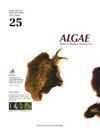从马尾藻(鱼腥草科)中提取的岩藻黄素对严重急性呼吸系统综合征冠状病毒 2 的抗病毒作用
IF 2.4
3区 生物学
Q1 MARINE & FRESHWATER BIOLOGY
引用次数: 0
摘要
人类冠状病毒疾病,特别是严重急性呼吸系统综合征冠状病毒 2,仍然是一个持久的公共卫生问题,最近的许多研究都集中在寻找抗冠状病毒的新线索上。为了为这一不断增长的知识库做出贡献,并探索现有的抗冠状病毒海洋天然产品,本研究调查了从韩国济州岛的褐藻--马尾藻(Sargassum siliquastrum)中分离出来的岩藻黄素的抗病毒作用。通过分子对接、分子动力学模拟和体外比色法验证了其结构特征。福柯黄素对感染的抑制作用呈浓度依赖性,且无细胞毒性。分子对接模拟显示,岩藻黄素与血管紧张素转换酶2-尖峰蛋白(结合能-318.306 kcal mol-1)和主蛋白酶(结合能-205.118 kcal mol-1)结合。此外,分子动力学模拟显示,岩藻黄素与血管紧张素转换酶 2-尖峰蛋白的对接时间为 20 ns,而与主蛋白酶的对接时间为 3 ns。此外,还通过体外比色法,以浓度依赖的方式抑制了血管紧张素转换酶 2 和尖峰蛋白之间的结合,从而验证了对岩藻黄质的硅学预测。这些结果表明,岩藻黄素通过阻断病毒的进入,对严重急性呼吸系统综合征冠状病毒2具有抗病毒作用。因此,鞘氨醇中的岩藻黄素可作为治疗冠状病毒感染的潜在候选物质。本文章由计算机程序翻译,如有差异,请以英文原文为准。
Antiviral effect of fucoxanthin obtained from Sargassum siliquastrum (Fucales, Phaeophyceae) against severe acute respiratory syndrome coronavirus 2
Human coronavirus diseases, particularly severe acute respiratory syndrome coronavirus 2, still remain a persistent public health issue, and many recent studies are focusing on the quest for new leads against coronaviruses. To contribute to this growing pool of knowledge and explore the available marine natural products against coronaviruses, this study investigated the antiviral effects of fucoxanthin isolated from Sargassum siliquastrum—a brown alga found on Jeju Island, South Korea. The antiviral effects of fucoxanthin were confirmed in severe acute respiratory syndrome coronavirus 2-infected Vero cells, and its structural characteristics were verified in silico using molecular docking and molecular dynamic simulations and in vitro colorimetric method. Fucoxanthin inhibited the infection in a concentration-dependent manner, without showing cytotoxicity. Molecular docking simulations revealed that fucoxanthin binds to the angiotensinconverting enzyme 2-spike protein (binding energy -318.306 kcal mol-1) and main protease (binding energy -205.118 kcal mol-1). Moreover, molecular dynamic simulations showed that fucoxanthin remains docked to angiotensin-converting enzyme 2-spike protein for 20 ns, whereas it breaks away from main protease after 3 ns. Also, the in silico prediction of the fucoxanthin was verified through the in vitro colorimetric method by inhibiting the binding between angiotensinconverting enzyme 2 and spike protein in a concentration-dependent manner. These results indicate that fucoxanthin exhibits antiviral effects against severe acute respiratory syndrome coronavirus 2 by blocking the entry of the virus. Therefore, fucoxanthin from S. siliquastrum can be a potential candidate for treating coronavirus infection.
求助全文
通过发布文献求助,成功后即可免费获取论文全文。
去求助
来源期刊

Algae
PLANT SCIENCES-
CiteScore
5.10
自引率
25.00%
发文量
18
期刊介绍:
ALGAE is published by the Korean Society of Phycology and provides prompt publication of original works on phycology. ALGAE publishes articles on all aspects of phylogenetics and taxonomy, ecology and population biology, physiology and biochemistry, cell and molecular biology, and biotechnology and applied phycology. Checklists or equivalent manu-scripts may be considered for publication only if they contribute original information on taxonomy (e.g., new combinations), ecology or biogeography of more than just local relevance. Contributions may take the form of Original Research Articles, Research Notes, Review Articles and Book Reviews.
 求助内容:
求助内容: 应助结果提醒方式:
应助结果提醒方式:


